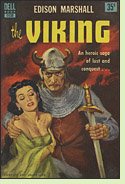The Viking
by Edison Marshall
Reviewed by David Maclaine

The Viking is the novel whose adaptation into a screenplay by Calder Willingham became the rousing action film The Vikings, with Kirk Douglas, Tony Curtis and Ernest Borgnine. The film, with its scenes of ax-throwing, oar-running, and a thrilling assault on an anachronistic castle, lured many of us into our first love for Viking lore, and it's heartening to be able to report that the original novel by Edison Marshall is a worthwhile read. Marshall tackles the great saga of how the mighty sea-rover Ragnar Lodbrok met his doom, a fall that led in turn to the destruction of the Kingdom of Northumbria. He spins the plot around a slave in Ragnar's household named Ogier, whose mysterious origin is hinted at early and whose early escape from doom will not surprise anyone who grasps the simple requirements of a tale told in first-person form. As in the film there is a bloody falcon attack, a struggle to survive a tide-pool ordeal, a harsh mutilation, and some crucial scenes in the fog where a compass prototype proves invaluable. The final twist when the hero's parentage is revealed surprises only in how far it goes: think Oedipus cubed.
Marshall's prose begins with a metaphoric resonance that fits the period, but by the time he treats the central love-story between Ogier and a captive Welsh princess he sometimes made me wonder whether there is an adjective form for poesy, to be used when poetic language crosses that line. Among the welcome elements of The Viking are its inclusion of a famous raid into the Mediterranean, and the author's earnest attempt to transform the famous death of Ragnar into something a bit less absurd than the saga original for those who know a little natural history. He doesn't fully succeed, but the novel is still an engaging transformation of some crucial tales at the center of the Viking Age. (1951, 380 pages)
More about The Viking at Amazon.comThe Viking appears on the list of The 45 Best Historical Novels Set in the Viking Age
Other novels about Viking raiders:
The Long Ships by Frans Gunnar Bengtsson (Swedish edition in two volumes 1941 and 1945; English translation in one volume 1954; the first volume published singly in English as Red Orm in 1943), a humorous adventure novel about tenth-century Viking raiders. More info
The Whale Road by Robert Low (2007), about a young man who joins a crew of Viking raiders about to go in search of a legendary treasure. See review or more info at Powell's Books
Blood Eye by Giles Kristian (2009), about a carpenter's apprentice taken prisoner by Viking warriors, who comes to enjoy their life of adventure and savagery; #1 in the Raven series. More info
Nonfiction about Vikings:
The Vikings: A History by Robert Ferguson (2009). More info
The World of the Vikings by Richard Hall (2007). More info
A History of the Vikings by Gwyn Jones (2nd edition, 1984). More info
At the Movies:
The Vikings
Online:
Vikings at the BBC History website
Back to Medieval Scandinavia and the Vikings
Back to Directory of Book Reviews